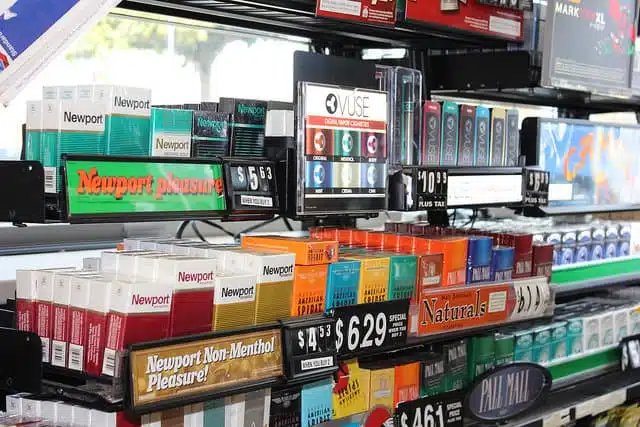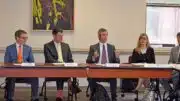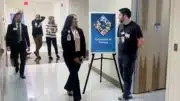By Emily Vespa
North Carolina is teetering on the edge of losing roughly $5.4 million in federal funds for combating the opioid epidemic and supporting substance use disorder treatment. If the state doesn’t slash youth tobacco access, it could forfeit funding. But North Carolina’s tobacco laws have made that difficult.
To receive federal block grant funding for substance use treatment and prevention, federal law says states have to annually survey a random sample of tobacco retailers and report the percentage of them that sell to people under 21 — the federal minimum tobacco sale age. If that percentage, called the retailer violation rate, exceeds 20 percent (with a +/-3 percent margin of error), a state could face penalties, including up to a 10 percent cut in its grant funding.
North Carolina’s retailer violation rate is pushing the margin of error of that 20 percent limit: It was 21.9 percent in the 2023 federal fiscal year, which ended on Sept. 30, 2023.
The state’s annual survey “continues to show an increase in the percentage of retailers who do not check ID and sell to minors,” a spokesperson for the North Carolina Department of Health and Human Services wrote in an email. If North Carolina doesn’t correct its course, it could put a portion of those federal dollars, which total more than $44 million a year, at risk.
- Substance use disorder treatment for youth and adults across the state, administered through local behavioral health management companies.
- Substance use prevention efforts through education in schools and prevention coalitions.
The rate’s been creeping up in part because of a limit on state law enforcement authority: North Carolina’s Alcohol Law Enforcement can’t enforce the federal minimum tobacco sale age, only the state’s, which is 18. That hinders its capability to reduce tobacco access for 18- to 20-year-olds.
In the past year, N.C. Alcohol Law Enforcement also reduced its tobacco enforcement due to unspecified “competing priorities,” according to the 2024 survey report, which gets sent off to the federal Center for Substance Abuse Prevention.
Even before the federal tobacco minimum sale age shifted from 18 to 21 in 2019, North Carolina’s retailer violation rate was dismal, often placing the state at the bottom of the nation for enforcement.
That’s partly because North Carolina is one of 16 states that doesn’t have a licensing system to track tobacco retailers, the survey report says. Research shows strong tobacco retail licensing requirements could reduce youth tobacco use. But without an official list of tobacco retailers, law enforcement can’t track new stores.
“As a result, these new stores often receive little or no immediate education about verifying IDs and complying with state or federal youth tobacco access laws,” a DHHS spokesperson wrote.
States that are out of compliance with the 20 percent retailer violation rate law haven’t faced penalties in the past few years thanks to a transition period mandated by Congress when it lifted the federal minimum tobacco age in 2019. That period will end this December.
States can still avoid the loss of substance use treatment funding if they negotiate a corrective action plan with the federal department of Health and Human Services, or if they commit more of their own funding to compliance efforts.
What’s next
Lawmakers took a step to curb youth vaping supply access with HB 900, a bill signed into law by Gov. Roy Cooper this month that will create a registry of vape products authorized by the Food and Drug Administration. Rep. Erin Paré (R-Holly Springs), a co-sponsor, told NC Health News that the registry can be used as a reference tool for the public.
“As a result of that, I think we’re going to see a lot of the elimination of this illegal product off the shelves and away from our kids being able to get their hands on it, which I think is a good thing,” Paré said.
As far as changing the state’s minimum tobacco age to align with the federal one, Paré said that’s a discussion for legislators.
“I know that there’s a different schools of thought on that,” Paré said. “We want to conform to the federal government so there’s no confusion on enforcement, however, there are some people that feel very passionately that if you’re sending your son off to war at 18, then he should be able to legally buy a vape.”
The survey report notes that North Carolina’s “efforts are increasing” to implement tobacco licensing and raise the state’s minimum age to purchase tobacco.
DHHS has a long history of tobacco prevention and education, and it partners with a slate of state, regional and local organizations and coalitions to “plan and implement culturally appropriate evidence-based strategies to reduce deaths, health problems and preventable health care costs due to tobacco use and secondhand smoke,” its spokesperson wrote.
That’s despite funding for tobacco control being eliminated from the state budget in 2013. It was years before any new money came from the state for tobacco cessation programs, but the Juul settlement forced the legislature to put dollars toward youth cessation programs in recent years.
Until the North Carolina tobacco law changes, the state will “continue to be diligent in its efforts to reduce youth tobacco use and access,” the report says.











